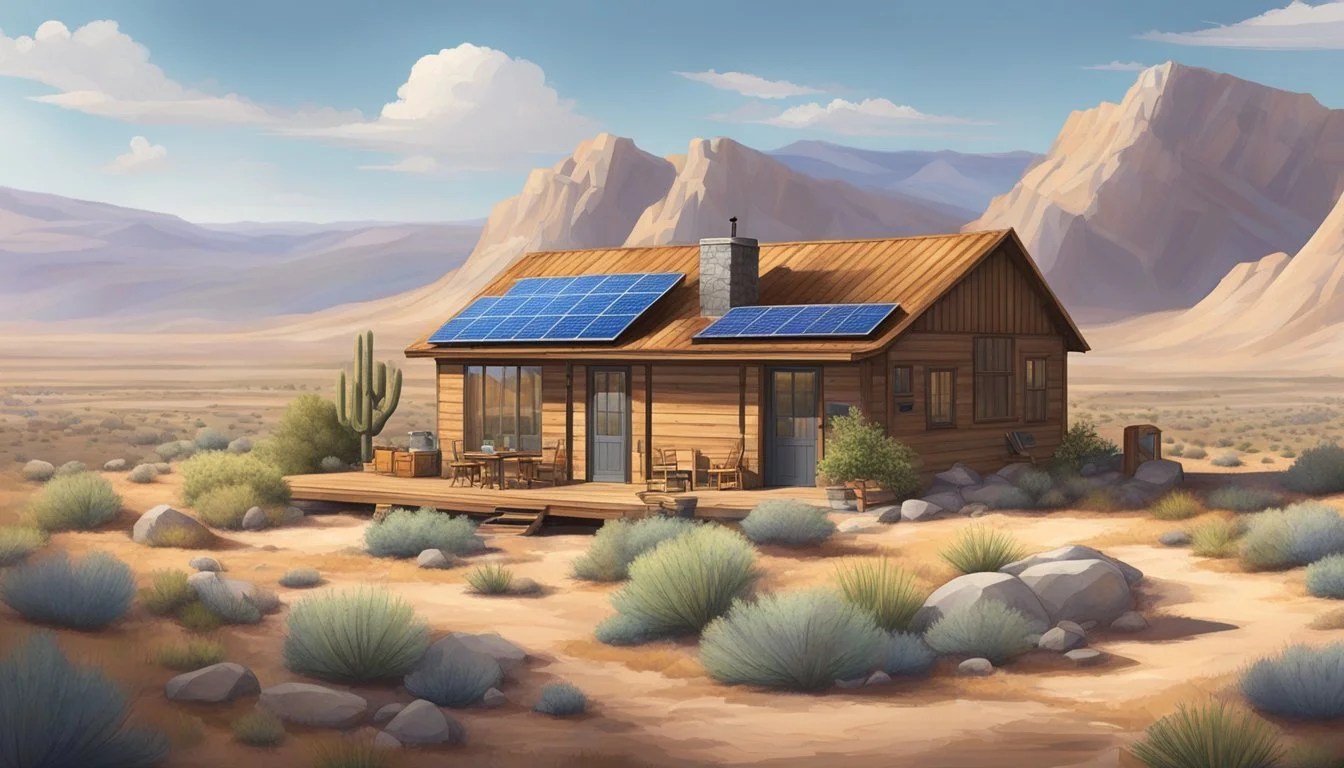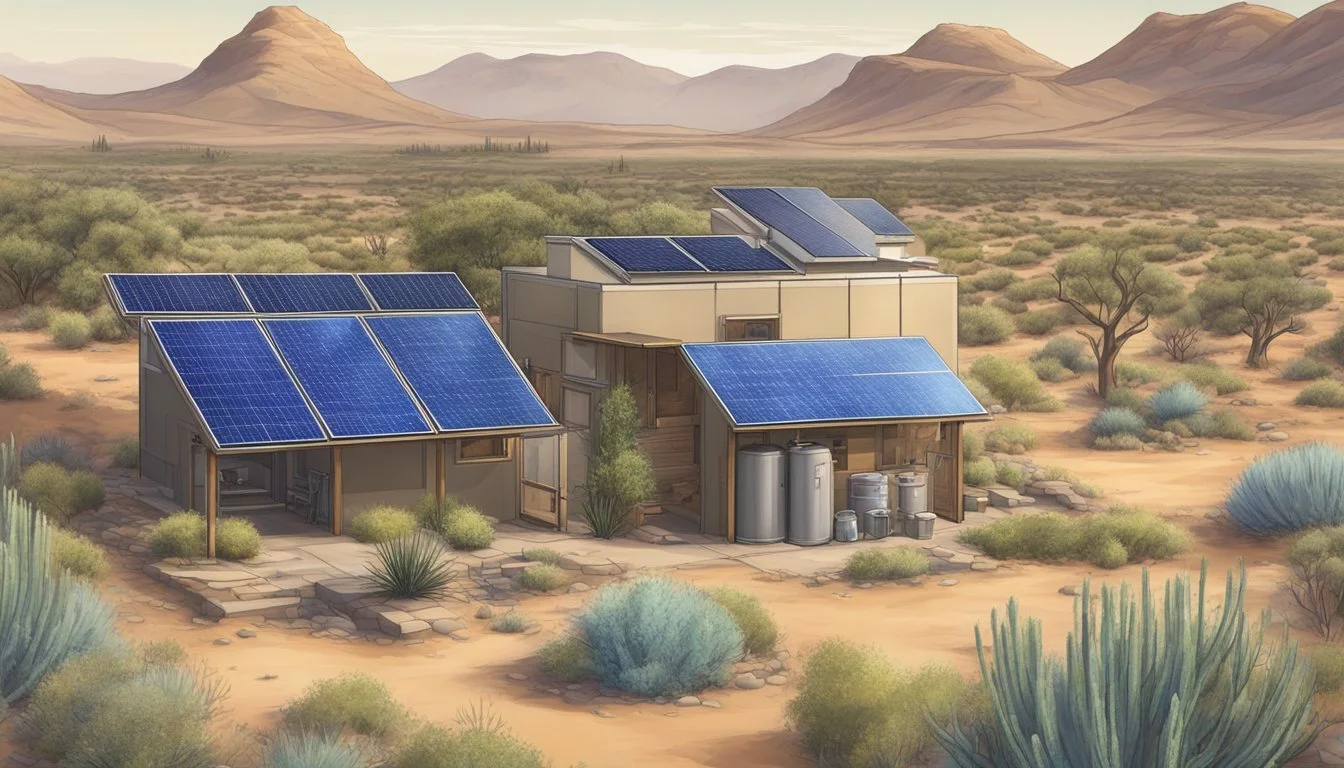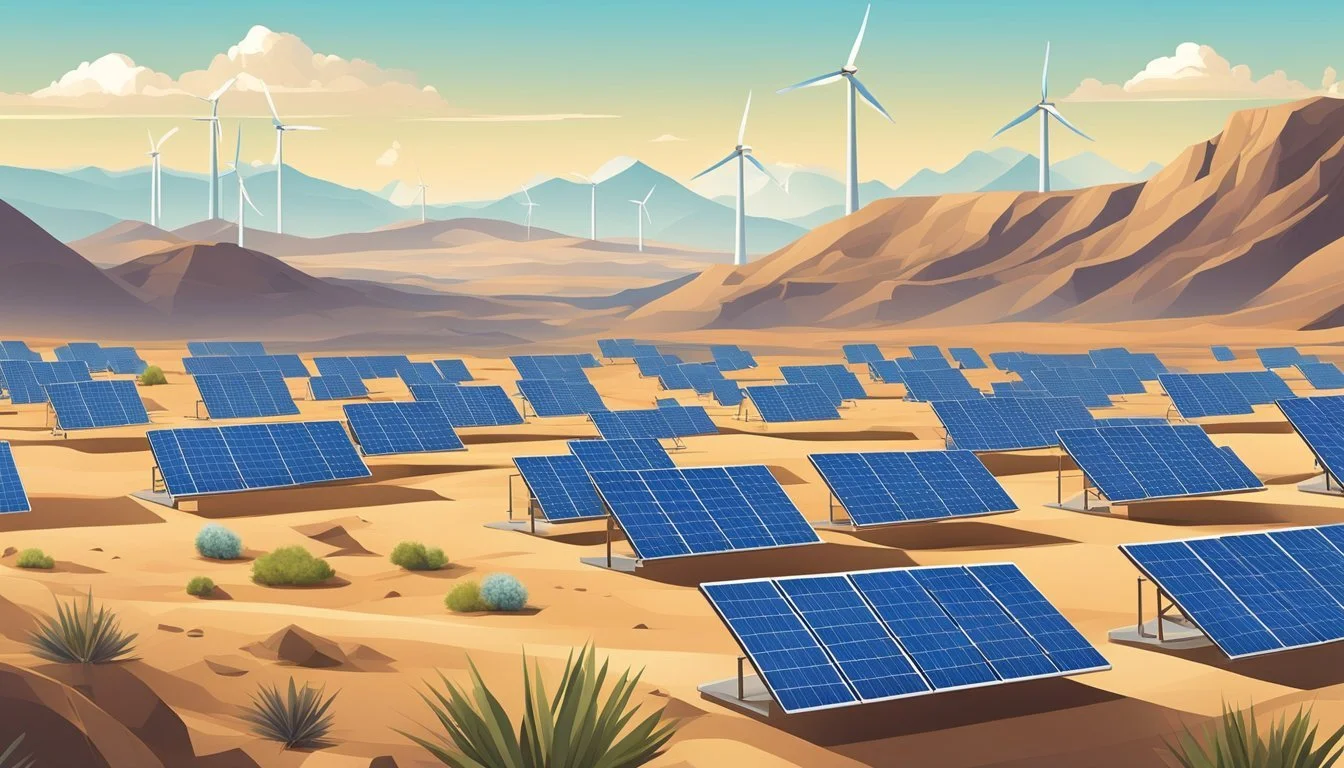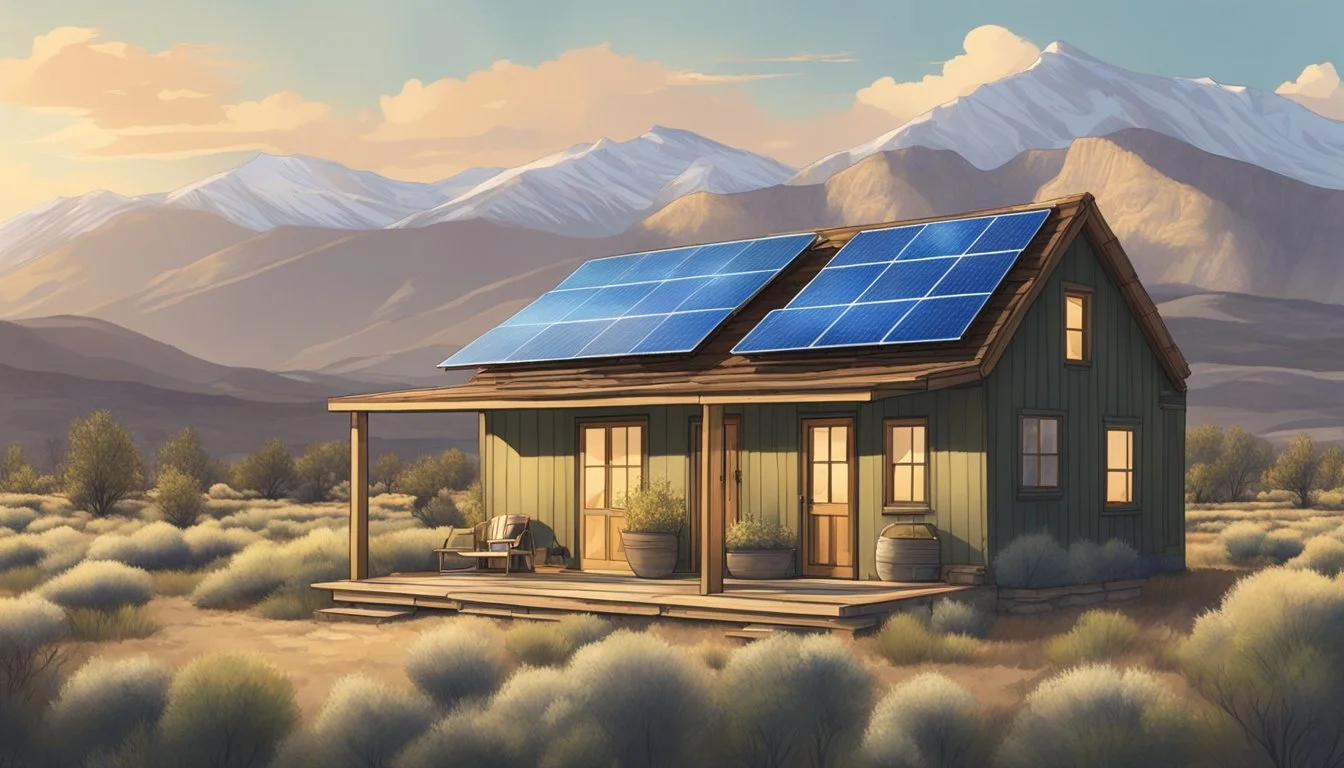Great Basin Off Grid Living
Sustainable Solutions and Lifestyle Tips
The Great Basin Desert, spanning Nevada, Utah, and California, presents an appealing option for those seeking an off-grid lifestyle. Its wide-open spaces and rugged beauty offer the serenity and freedom that many off-grid enthusiasts crave. The dry climate of the Great Basin makes it an ideal location for solar energy solutions, which can be a crucial component of sustainable living in such remote areas.
Essential to off-grid living in the Great Basin is access to water. Potentially miles away from municipal water sources, residents often rely on natural sources, wells, or even hauled water. Ensuring a stable and clean water supply is vital for any off-grid homestead in this arid region.
Adapting to the extreme temperatures is another critical aspect. Summers can be scorching, making it important to have effective cooling strategies to stay comfortable and hydrated. With careful planning and the right resources, living off-grid in the Great Basin can be an exceptionally rewarding experience.
Assessing the Great Basin Environment
The Great Basin, a climatically distinct region, offers unique challenges and opportunities for off-grid living. Understanding its climate, land, and water resources is crucial for successful settlement.
Climate Challenges
The Great Basin's climate is characterized by semi-arid conditions.
Temperature variability is significant, with hot summers and cold winters. The region can experience temperatures ranging from over 100°F in summer to below freezing in winter.
Precipitation is low, averaging 7 to 12 inches annually, largely falling as snow in higher elevations. This limited rainfall affects water availability and agricultural potential.
Climate change is also a concern, with observed warming trends impacting snowfall and water runoff patterns. residents must prepare for increased drought risk and the possibility of higher temperatures.
Land and Soil Quality
The land in the Great Basin is varied, including mountains and valleys.
Soil quality is a critical factor. The region has diverse soil types, often sandy or rocky, with low organic content. This can make traditional farming challenging.
Topography also varies, with alternating basins and ranges. Some land may have steep slopes, while others are more gentle, impacting land use options.
Vegetation is typically sparse, consisting of native shrubs and grasses. This can limit grazing potential and necessitate supplemental feeding for livestock.
Water Sources and Irrigation Systems
Water is a precious resource in the Great Basin.
Natural water sources include rivers, streams, and underground aquifers. However, these can be limited and highly variable depending on location and season.
Irrigation systems are essential for agriculture and personal use. Off-grid residents often rely on wells, rainwater collection, and efficient irrigation techniques like drip systems to maximize water use.
Sustainability practices such as xeriscaping and water conservation are important. These techniques help manage the scarce water supply effectively, ensuring it meets the needs of off-grid living.
Planning and Design for Off-Grid Homes
Effective planning and design for off-grid homes requires careful consideration of the location, energy efficiency, and incorporation of renewable energy solutions. Each aspect plays a crucial role in creating a sustainable, self-sufficient living environment.
Selecting the Right Location
Choosing an ideal location is critical for an off-grid home. Factors such as climate, water availability, and proximity to resources should be assessed. The terrain must support structures like solar panels or wind turbines. Access to sunlight is essential for solar energy utilization, while elevation can influence wind patterns for turbine efficiency.
Legal considerations must not be overlooked. Local zoning laws and building codes could affect the ability to build and live off-grid. It’s important to research and comply with all regulations to avoid potential issues.
Designing for Energy Efficiency and Sustainability
Designing with energy efficiency and sustainability in mind helps minimize reliance on external resources. Insulation and proper orientation of the house can reduce heating and cooling needs. Utilizing building materials such as straw bales or earth tires can enhance thermal performance.
Incorporating passive solar design principles, like large south-facing windows and thermal mass floors, can help maintain a comfortable indoor temperature. Water conservation measures, including rainwater harvesting and greywater systems, should also be integrated into the design for greater efficiency.
Incorporating Renewable Energy Solutions
Integrating renewable energy solutions is key to off-grid living. Solar energy systems, including photovoltaic panels and solar thermal collectors, are popular choices due to their efficiency and decreasing costs. They can provide a substantial amount of electricity and heating.
Wind turbines are another viable option, especially in areas with consistent wind. These turbines convert wind energy into usable electricity, complementing solar systems and providing energy during less sunny periods.
Hybrid systems, combining multiple renewable energy sources, can offer a more reliable power supply. Battery storage systems are essential for storing excess energy, ensuring a continuous power supply even when production varies. Sustainable practices in both construction and daily living support the overarching goal of living independently and responsibly off-grid.
Building Essentials for Off-Grid Living
Constructing and maintaining a sustainable and self-sufficient off-grid home requires careful planning, appropriate materials, and suitable building methods. A successful project depends on understanding the diverse aspects of creating an off-grid living space.
Constructing Dwellings
Constructing an off-grid dwelling involves selecting the type of home that best suits the environment and personal preferences. Popular choices include cabins, yurts, tiny homes, and log cabins.
Cabins: Offer sturdy and insulated structures, ideal for harsh climates.
Yurts: Circular tents with a wooden frame and fabric covering, suitable for mild conditions and quick setups.
Tiny Homes: Compact, often portable houses emphasizing minimalism and efficient space use.
Log Cabins: Built using logs, providing natural insulation and a rustic aesthetic.
Choosing appropriate designs and materials ensures durability and comfort.
Sourcing Materials and Tools
Efficient sourcing of building materials and tools is crucial for an off-grid project. Materials should be sustainable, durable, and ideally sourced locally to reduce environmental impact and transportation costs.
Building Materials: Wood, reclaimed materials, stone, and earth.
Insulation: Straw bales, wool, or cellulose for efficient thermal control.
Tools: Basic hand tools (hammers, saws, levels) and specialized tools (solar panel kits, water filtration systems).
Tools must be compatible with off-grid power sources, and materials should contribute to the home’s sustainability and ecological footprint.
Alternative Building Methods and Structures
Innovative and eco-friendly building methods and structures enhance off-grid living.
Earthships: Homes built using recycled materials like tires and bottles, designed for energy efficiency.
Passive Solar Design: Structures oriented to optimize natural light, reducing heating and cooling needs.
Rainwater Harvesting Systems: Collect and store rainwater for potable and non-potable uses.
Solar Power: Installations for electricity, essential for powering tools and appliances.
These methods ensure the construction of self-sustaining and environmentally friendly homes.
By focusing on constructing types of dwellings, sourcing suitable materials and tools, and exploring alternative building methods, one can create a functional and sustainable off-grid living space.
Water Management
Effective water management is crucial for off-grid living in the Great Basin. This involves both the collection and storage of rainwater and the treatment and reuse of wastewater. Proper systems ensure a reliable water supply and sustainable practices.
Rainwater Collection and Storage
Rainwater collection becomes essential due to the arid climate in the Great Basin. A well-designed collection system should include gutters and downspouts to channel water into storage tanks. These tanks can be installed on the roof or at ground level, depending on the setup.
Storage tanks should be sized appropriately to meet the household’s needs, especially during dry seasons. Filtration systems are crucial to remove impurities from collected rainwater, making it safe for household use. First-flush diverters can be used to eliminate contaminants from the initial runoff.
Material selection for tanks is significant, with polyethylene and aluminum offering durability and safety. Regular maintenance ensures the system remains effective. Water pumps powered by solar or wind energy can facilitate the distribution of stored rainwater throughout the property.
Waste Water Treatment and Reuse
Treating and reusing wastewater conserves resources and reduces environmental impact. A septic system is a common method for managing wastewater in off-grid settings. Septic tanks separate solids and liquids, with solids breaking down naturally over time.
Gray water systems offer an alternative, allowing water from showers, sinks, and washing machines to be filtered and reused. Filtration and treatment can include simple methods like gravel and sand filters, or more complex systems involving bioreactors.
The treated water can be reused for irrigation, reducing the overall water consumption. It's important to follow health guidelines to ensure treated water is safe for reuse. Regular monitoring and maintenance of the system ensure its continued efficiency and safety.
Power and Energy Solutions
Living off-grid in the Great Basin requires innovative power solutions. Key energy options include harnessing solar power, utilizing wind energy and generators, and ensuring efficient energy storage and electricity management.
Harnessing Solar Power
Solar power is a primary energy solution for off-grid living. Solar panels can be installed on rooftops or open spaces to capture sunlight and convert it into electricity.
The Great Basin’s sunny climate makes it an ideal location for solar energy. Solar panel systems can vary in size and efficiency, typically generating ample power during peak sunlight hours.
Investing in high-quality solar panels and ensuring proper installation are crucial for maximizing energy output. Regular maintenance, such as cleaning the panels and checking connections, helps maintain efficiency and extend the system’s lifespan.
Wind Energy and Generators
Wind energy complements solar power, especially during cloudy days or winter months when sunlight is limited. Wind turbines, installed on elevated areas, capture wind to generate electricity.
A combination of solar panels and wind turbines can ensure a continuous supply of energy. Wind turbines come in various sizes, and the choice depends on the wind conditions in specific locations within the Great Basin.
In addition to renewable sources, diesel or propane generators offer a reliable backup energy supply. These generators can automatically kick in during periods of low renewable energy production, ensuring an uninterrupted power supply.
Energy Storage and Electricity
Efficient energy storage is essential for managing off-grid electricity. Batteries store surplus energy generated by solar panels and wind turbines, making it available for use during nighttime or cloudy days.
Lithium-ion batteries are popular due to their high energy density and long lifespan. Systems like Tesla Powerwall provide robust storage solutions, capable of storing significant amounts of electricity for households.
Electricity management systems monitor and distribute stored energy efficiently. Smart inverters and control systems ensure a balanced energy distribution, optimizing power usage and reducing waste. Properly sized storage and management systems can help maintain a stable energy supply, crucial for off-grid living in the Great Basin.
Food and Agriculture
Sustainable practices in food production are essential for off-grid living in the Great Basin. This involves various methods including sustainable farming, raising livestock, and foraging for wild food sources.
Sustainable Farming and Gardening
Sustainable farming and gardening are vital for off-grid living and include practices like crop rotation, composting, and using heirloom seeds. Compost, made from organic waste, provides essential nutrients and improves soil quality.
Herbs, fruit trees, and vegetables are commonly grown, offering diverse and nutritious food sources. Raised beds and greenhouses help extend growing seasons, especially important in the Great Basin's variable climate. Cover crops and mulching techniques help conserve water and soil resources.
Drip irrigation systems efficiently water plants and reduce waste, ensuring that crops like beans and root vegetables thrive.
Raising Livestock and Poultry
Livestock and poultry provide meat, eggs, milk, and other products essential for a balanced diet. Chickens and ducks are popular for their eggs and meat. Goats and sheep are useful for milk, meat, and wool, while pigs are raised for pork.
Maintaining the health of these animals involves understanding their dietary needs and providing adequate shelter and space. Free-range systems allow animals to forage, which can reduce feed costs and improve the sustainability of the operation. Manure from livestock can be composted and used to enrich garden soil, creating a closed-loop system.
Foraging and Wildcrafting
The Great Basin offers various edible plants and mushrooms that can be foraged. Common foraged items include berries, nuts, and greens. Wild mushrooms are another resource, but they must be identified carefully to avoid toxic varieties. Edible wild plants often include dandelions, acorns, and various wild berries.
Foraging requires knowledge of local flora and understanding the seasonal availability of different plants. Ethical foraging practices ensure that plant populations remain healthy and abundant. This includes taking only what is needed and leaving enough for wildlife and plant regeneration. Foraging provides a sustainable and cost-effective way to supplement food supplies.
Waste Management and Recycling
Effective waste management is crucial for those living off-grid in the Great Basin. Techniques such as composting and recycling help minimize waste and promote sustainability in a remote environment.
Composting Techniques
Composting is an essential method for off-grid waste management. A composting toilet is particularly useful, as it reduces human waste into usable compost. These toilets are designed to be odorless and efficient, converting waste into valuable fertilizer for gardens.
Another technique involves kitchen waste composting. Vegetable scraps, coffee grounds, and eggshells can be composted using outdoor bins or indoor worm composting systems. Maintaining the right balance of green (nitrogen-rich) and brown (carbon-rich) materials ensures rapid and effective breakdown.
Manure composting from livestock is also common. Properly managed, it provides rich fertilizer but should be handled carefully to prevent contamination.
Recycling and Repurposing Material
Recycling and repurposing materials reduce the need for waste disposal in remote locations. Metal, glass, and certain plastics should be cleaned and stored for periodic recycling runs to nearby facilities.
Creative repurposing is also effective. Old containers can become plant pots, and scrap wood can be repurposed into furniture or structures. Graywater recycling systems reuse water from sinks and showers for irrigation, reducing overall water waste.
Efforts to minimize single-use items, by using reusable containers or cloth bags, further diminish waste production. Collecting rainwater and implementing low-flow fixtures are added measures to conserve resources integral to sustainable off-grid living.
Lifestyle and Mindset
Living off-grid in the Great Basin demands a unique approach to daily life and thinking. Individuals must cultivate an adaptable lifestyle, self-sufficient skills, and a supportive community network.
Adapting to Off-Grid Life
Resourcefulness is crucial for off-grid living in the Great Basin. The harsh environment requires residents to be flexible and prepared for unexpected challenges. They must learn to manage fluctuating temperatures and scarce water resources.
Flexibility extends to energy sources. Being able to switch between solar, wind, and perhaps even backup generators ensures a stable energy supply. Adapting to these changes is a significant part of the off-grid mindset, ensuring that residents can handle whatever comes their way.
Self-Sufficiency Skills
Practical skills are pivotal in achieving self-sufficiency. Residents must be proficient in basic construction, repairs, and system maintenance. Knowledge of solar panel installation and water filtration systems is invaluable.
Gardening and animal husbandry also play central roles. Growing food and raising livestock for meat, dairy, and eggs reduce dependence on external supplies. Medical skills can also be crucial, given the remote location. Self-sufficiency skills foster a sense of independence and confidence.
Community and Network Building
Building a community network provides essential support. While off-grid living focuses on self-reliance, connecting with others facing similar challenges enhances knowledge sharing and resource exchange.
Communities can assist during emergencies and share tools or supplies. Social gatherings sustain emotional well-being. In the Great Basin, where distances can be vast and isolation significant, maintaining community ties is fundamental for a balanced off-grid lifestyle. Sharing insights and experiences helps everyone thrive.
Maintenance and Upkeep
Proper maintenance and regular upkeep are crucial for off-grid living in the Great Basin. Addressing routine tasks and seasonal preparations ensures homes and systems run efficiently, minimizing the risk of unexpected issues.
Routine Maintenance for Homes and Systems
Routine maintenance includes checking and servicing essential systems such as water, septic, and solar power. Water systems demand frequent inspection for leaks, ensuring filters and purifiers function correctly. Septic systems need regular pumping, depending on usage.
Solar panels should be cleaned periodically to maintain efficiency, while battery storage must be checked for proper charge levels. Structural components like roofing and insulation require annual inspection to identify and address wear and tear quickly. Using a maintenance checklist can assist in staying on top of these tasks.
Seasonal Preparations and Considerations
Seasonal changes in the Great Basin can significantly impact maintenance needs. In preparation for winter, insulating pipes and sealing any drafts in the home are paramount to prevent freezing and energy loss. Ensuring that backup generators are fueled and operational is also crucial.
For summer, checking and maintaining cooling systems helps avoid overheating. Vegetation around the home should be cleared to reduce fire hazards. Regularly servicing water collection systems, such as gutters and rain barrels, ensures they do not get clogged with debris.
By proactively managing these tasks, residents can handle seasonal challenges more effectively, ensuring their off-grid systems continue to operate smoothly year-round.
Legal Considerations and Logistics
Living off-grid in the Great Basin involves navigating a diverse set of legal considerations and practical logistics. Key focus areas include understanding local regulations and ensuring access to essential public utilities and roadways.
Navigating Local Laws and Regulations
Legal compliance is crucial for off-grid living. Local zoning laws determine where one can legally establish an off-grid residence. Zoning regulations might restrict the type of structures allowed or mandate certain building codes that must be adhered to.
Building permits are often required, and failing to obtain them can result in legal penalties. Residents must also consider water rights since access to water can be heavily regulated, especially in remote areas. It's important to research renewable energy installations and ensure they meet safety standards to avoid legal issues.
Access to Public Utilities and Roads
Accessing public utilities is essential if going off-grid. Basic utilities like water, electricity, and sewage systems might need to be self-managed. Installing systems like solar panels and rainwater collection requires adherence to safety standards to prevent legal problems.
Road access is critical for transporting necessary supplies. Ensuring that the chosen location has legal access to public roads is important to avoid conflicts with local authorities. In some areas, maintaining road access might involve negotiating easements or right-of-way agreements with neighboring property owners.
Challenges and Considerations
Living off-grid in the Great Basin Desert poses unique challenges that require careful planning and preparation. Key areas to focus on include overcoming typical hurdles and ensuring emergency preparedness and safety.
Overcoming Common Hurdles
The Great Basin Desert's extreme temperatures and dry climate necessitate advanced adaptability. Reliable water sources are critical; residents often rely on rainwater catchment systems or well water. Securing enough water is crucial due to the scarcity of natural water supplies.
Energy needs must be met through sustainable sources such as solar panels, given the area's abundant sunlight. Battery storage systems can help mitigate energy shortages during less sunny periods.
Isolation presents another challenge. Limited access to amenities and support services means residents must develop self-sufficiency. Establishing strong community connections can aid in mitigating isolation effects.
Emergency Preparedness and Safety
Safety in such a remote area requires thorough planning. Emergency kits should include first aid supplies, non-perishable food, and water. Given the desert environment, it's essential to prepare for both extreme heat and cold nights.
Fire risks are high, so creating and maintaining defensible space around the homestead reduces wildfire threats. Understanding local wildlife and adopting measures to prevent encounters can further enhance safety.
Adequate communication systems, like satellite phones or ham radios, ensure residents can reach help if needed. Regular preparedness drills and staying informed about weather patterns and emergencies contribute to overall safety.
Impact and Benefits
Living off-grid in the Great Basin offers significant benefits in terms of environmental conservation, economic savings, and health improvements. This lifestyle fosters self-sufficiency and reduces reliance on traditional systems.
Environmental Impact and Conservation
Off-grid living in the Great Basin has a positive environmental impact. By harnessing renewable energy sources like solar and wind, residents reduce their carbon footprint and promote sustainable living. These methods of power generation help conserve natural resources and minimize pollution.
Water conservation is also critical. Rainwater harvesting and well-water usage support water sustainability. These practices reduce the strain on municipal water supplies, highlighting a commitment to conservation in a region where water is scarce.
Recycling and composting further aid in reducing waste, making the off-grid lifestyle eco-friendly.
Economic Considerations and Savings
Financial aspects play a substantial role in off-grid living. Initial investments in solar panels, wind turbines, and water harvesting systems might be significant. However, long-term savings are notable. Residents cut out monthly utility bills, allowing for substantial budget reallocation.
By growing their own food, individuals also save on grocery costs. They achieve a level of financial freedom not possible in conventional living situations. These savings contribute to a reduced overall household budget, freeing up money for other important expenditures.
Minimal reliance on public utilities buffers residents against price hikes and supply disruptions, leading to stable economic conditions.
Health and Wellness
Health and wellness see considerable improvement through this lifestyle. The Great Basin offers fresh air and open spaces, promoting respiratory health. Physical activity increases with the demands of maintaining the land and systems, contributing to better overall fitness.
Mental health also benefits from reduced stress levels due to a connection with nature and away from urban chaos. Off-grid living supports a balanced diet rich in home-grown, organic produce, enhancing nutritional intake.
Additionally, the strong sense of community among off-grid dwellers fosters social well-being, as individuals collaborate and support each other in this sustainable lifestyle.











